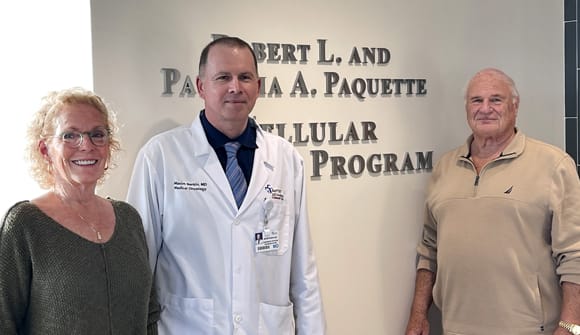Obesity boosts liver cancer’s rise
Alcoholism and history of IV drug use also contribute to hard-to-treat disease.
Article Date:

As if you needed another reason to practice healthy habits, eat well and cut back on carbs—consider liver cancer.
It’s hard to detect, hard to turn around once you have it, and 70 percent of the time, it’s caused by something that is entirely preventable.
“Liver cancer is the coming plague,” said Robert Zaiden, MD, a gastrointestinal oncologist with Baptist MD Anderson Cancer Center. “It’s the fastest-growing type of cancer in the U.S., and it’s the only one with rates that continue to increase every year.”
According to the U.S. Centers for Disease Control and Prevention, liver cancer deaths increased 43 percent among men and 40 percent among women between 2000 and 2016.
In 2000, liver cancer was the ninth-leading cause of cancer deaths. By 2016, it was the sixth.
Doctors have been expecting a rise in liver cancer for decades. That’s because one of the main causes is hepatitis. Hepatitis is commonly spread through infected blood, which can happen when intravenous drug users share needles.
“Unfortunately, there were a lot of Baby Boomers who experimented with IV drugs and who were exposed to hepatitis,” Dr. Zaiden said. “Those people are getting older and they’re getting to an age where their livers have had enough time to scar and become damaged.”
What doctors didn’t factor in, though, is today’s obesity epidemic.
Liver cancer typically happens when tissue in the liver is scarred, a condition called cirrhosis. The scarring comes from inflammation, which may be caused by hepatitis or other infectious diseases. However, it can also be caused by an excess of fat being deposited in the liver.
Alcoholism has long been known to cause cirrhosis, and the rising rate of drinking among young people is worrisome, Dr. Zaiden said. But, the newest and fastest growing cause of cirrhosis is fatty liver caused by obesity.
“It’s actually a significant health concern, because one in three Americans is now considered obese,” Dr. Zaiden said.
Obesity and fatty liver accounted for about 40 percent of new liver cancer diagnoses in 2016.
There is no standard screening test for liver cancer, and the prognosis is not good. Early-stage liver cancer—before it has spread—has a 31 percent survival rate. Once spread, the rate drops to 3 percent.
Even when the disease is caught at an early stage, it’s very tough to fight.
“The problem is the liver has often already been damaged by cirrhosis,” Dr. Zaiden said. “You’re removing the visible cancer, but the clock is ticking on the rest of the liver.”
Many patients seek a liver transplant. And, that is difficult to get.
How to prevent liver cance
Doctors’ No. 1 strategy in fighting liver cancer is an ounce of prevention. That means:
- If you are a heavy drinker or you abuse alcohol, cut back.
- Don’t do IV drugs. Don’t share needles.
- If you had a blood transfusion or an organ transplant before 1992, get checked for hepatitis. Before 1992, donated blood and organs were not screened for hepatitis. Today hepatitis can be cured.
- If your Body Mass Index (BMI) is outside of the ideal range, and especially if you’ve had CT scans that show fatty liver, you should aggressively try to lower your weight.
- If you have risk factors, pay attention to the liver function test on the blood work from your annual check-up with your primary care provider. It doesn’t screen for liver cancer but it can indicate liver damage.
- Finally, if you have symptoms like abdominal swelling and loss of appetite, and if your skin and the whites of your eyes turn yellow, see your primary care physician. It might just save your life.
For more information about liver cancer symptoms and risks, visit your primary care physician. If you don’t have a primary care provider, visit baptistjax.com/bpc-appt to find a doctor near you.



